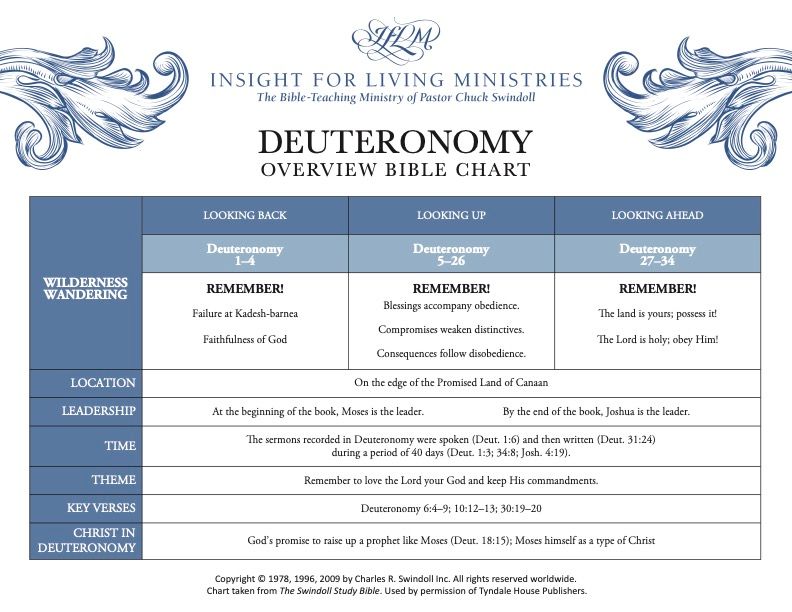Like a good detective, let's examine this book.
🔥 Overview
Moses is now old. He has been told by God that he will not be allowed into the Promised Land. He has been allow to view it from across the Jordan, but it will be up to Joshua and the young nation to fulfill the promises made to their ancestors.
Deuteronomy is a Greek word meaning "Second Law." That is exactly what this book is. Moses is giving the covenant of Yahweh to the next generation in a series of sermons so they can be ready to occupy the land God is giving them.
The mental picture is amazing. Old Moses is preaching to a young nation. He cannot go, but he can cheer them on.
🔍 Things to Notice
- This is a series of sermons. Notice when one sermon ends and a new one begins.
- Because Moses is giving the covenant law for a second time, notice the parallels between this book and Exodus and Leviticus.
- Moses has now been leading this nation for many years. He knows their strengths and weaknesses. Notice how he continually warns them to not turn away from God. This is a pattern he was watched for years.
- Toward the end of this book, Moses continually tells Joshua not to be afraid nor discouraged. This was something said multiple times. Was this because Joshua tended to be discouraged and afraid or was it due to the immense tasks that still lay ahead?
- Moses likely did not write the final chapter of this book. The places listed had not yet been occupied by Israel and it is highly unlikely he would have written about his death before it happened in that way.
🙏 Jesus in this Book
(Every book reveals the glory of God, displayed in Christ Jesus)
- Jesus is the Lawgiver
- Jesus, the Giver of Life (Deut. 30)
👀 Themes
- Looking back to see forward
- Trust and Obey. It's the only way.
- Offerings
- Rituals for worship
- A how-to guide for keeping God's promises
- Second Law
- Building on the promises of God by loving Him and obeying Him
😀 Who?
Who wrote it: Moses.
He likely dictated the contents to a scribe. The authorship remains the same. The only portion not ascribed to Moses is the final chapter.
Who is the original audience: The nation of Israel.
🪧 Where?
Where are we: Moses likely wrote this book at the banks of the Jordan River.
⏳ When?
When was it written: When was it written: The period of the first 5 books of the Bible are disputed. A reasonable estimate is between 1406 BCE. This would place the writing at the end of the 40 years of wandering.
🤔 What?
What is the big idea: The overall concept of this book is "second law." Moses is giving the new generation the law first given to their parents. During this time, there was no mass production of the covenant for everyone to read. Moses tells the nation to gather every 7 years to hear the words of the law that he is writing in this book. He wants to make sure everyone has the tools they need to love the Lord, honor the Lord, and obey the Lord.
🧐 Why?
Why is this book important: In this book, Moses addresses "all Israel" at least twelve times. From Mount Sinai to the banks of the Jordan river, much time has passed. There have been many times to divide the nation and the entire first generation has passed. Moses now rallies the people together to prepare for the next part of their journey. He restates the Ten Commandments and builds a covenant lifestyle from that foundation. This book delivers to Israel the keys for living a covenant lifestyle so they can remain blessed for generations. It also outlines the way back if they ever get of course.
📝 How?
How can I apply it?: Moses repeatedly tells the nation to trust and obey the Lord. He continually says they have the choice and to make the right choice. The key verse of this entire book is:
“I have set before you life and death, the blessing and the curse. So choose life in order that you may live, you and your descendants, by loving the Lord your God, by obeying His voice, and by holding fast to Him; for this is your life and the length of your days.” (Deuteronomy 30:19–20)
This still true for us today. Everything written in the pages of the Bible are for our benefit. They are written to reveal the goodness of God and they invite us to choose Him. Every day we can choose life.




